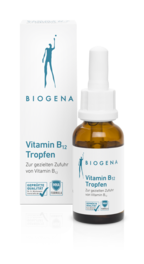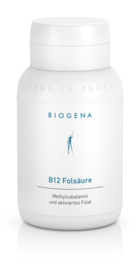Vitamin B12 is a real all-rounder – it can do much more than just support your nervous system! If you follow a vegan or vegetarian diet, it is particularly important to know how to get enough B12. We show you how to optimise your vitamin B12 intake and explain its many benefits!
What is vitamin B12?
Vitamin B12, also known as cobalamin, is a water-soluble vitamin that is essential for various vital functions in the body. Because of its colour – it is also known as the “red vitamin” – B12 was the last of the vitamins known today to be discovered (1926). However, this does not make the water-soluble nutrient less important for us humans.
It plays a central role in cell division and in the functioning of the nervous system and it is indispensable for the formation of blood cells, especially red blood cells.
However, this essential vitamin is found almost exclusively in foods of animal origin such as meat, fish, eggs and dairy products. People who eat vegan foods therefore have an increased risk of developing vitamin B12 deficiency because this nutrient is hardly ever present in plant-based foods. People who eat a lacto-vegetarian diet, i.e. do not eat meat, fish or eggs, also potentially absorb less vitamin B12, especially if dairy products are only on the menu to a very limited degree.
Because of its colour, vitamin B12 is also called the “red vitamin”.
What is vitamin B12 needed for in the body?
Vitamin B12is an essential vitamin that is involved in blood formation and cell division. It also contributes to normal homocysteine metabolism, to the immune function, to energy metabolism and to normal mental functions.
What are vitamin B12 foods?
As already mentioned, vitamin B12 is only found in animal foods in quantities that meet the average person’s needs. What are vitamin B12 rich foods? Foods that are high in vitamin B12 are meat, fish, eggs meat, fish, eggs, offal and dairy products. People who often consume them, can usually meet their daily needs. However, there is usually no vitamin B12 in plant-based foods. Exceptions are fermented foods such as sauerkraut or beer as well as bacterially contaminated foods (e.g. bulb and root vegetables), which can contain various B12 variants in traces. However, under certain circumstances these compounds are present in a form that cannot be used by us (“vitamin B12 analogues”) and can even further hinder the vitamin B12 that we use in its utilisation through their mixing.
B12 vitamin supplements
In order for our bodies to utilise vitamin B12, it must first be extracted from food. It then binds to a special protein, the intrinsic factor, which is produced in the stomach lining. Only then can vitamin B12 be actively absorbed in the small intestine.
The good news is that in higher doses, e.g. through supplements (vitamin B12 tablets, capsules or drops), the body can also absorb vitamin B12 passively through the intestinal mucosa.
Daily vitamin B12 requirement: How much per day?
Our body doesn’t need much, and according to the DGE (Deutsche Gesellschaft für Ernährung [German Nutrition Society]), 4μg daily is enough to maintain the vitamin B12 balance in the body. One exception – as is often the case – is the special phase of pregnancy and breast-feeding. During this period, the need for B12 increases to 4.5 μg and 5.5 μg daily. Our organism has stores for somewhat "leaner B12 times". If well filled, they accommodate approximately a thousand times the amount (4 g) of the daily B12 requirement. However, a constant shortage in supply can empty the storage tanks over the short or long time.
Vitamin B12 intake: When should vitamin B12 be taken?
To improve absorption, it is helpful to take vitamin B12 on an empty stomach or between meals.
Vitamin B12 values & blood count
In order to check the vitamin B12 balance, the total vitamin B12 is usually measured in the blood. However, this value only ever indicates a B12 deficiency quite late in the day. Even if the value of the total vitamin B12s is not alarming, there may already be an insufficient supply. Ideally, further values should therefore be used. Holotranscobalamin (Holo-TC), also known as “active B12”, is a laboratory value that indicates B12 deficiency early on. Low Holo-TC values indicate a drainage of the B12 supply or a negative B12 balance. Methylmalonic acid (MMS) values also indicate our B12 status.In this case, increased values indicate empty B12 depots.
Daily vitamin B12 requirement: How much per day?
Our body doesn’t need much, and according to the DGE (Deutsche Gesellschaft für Ernährung [German Nutrition Society]), 4μg daily is enough to maintain the vitamin B12 balance in the body. One exception – as is often the case – is the special phase of pregnancy and breast-feeding. During this period, the need for B12 increases to 4.5 μg and 5.5 μg daily. Our organism has stores for somewhat "leaner B12 times". If well filled, they accommodate approximately a thousand times the amount (4 g) of the daily B12 requirement. However, a constant shortage in supply can empty the storage tanks over the short or long time.
Vitamin B12 & folic acid: better together
Vitamin B12and folic acid are team players and work closely together within our metabolism – they contribute to homocysteine metabolism and play a role in blood formation *. In addition, these two-water-soluble B vitamins support the normal functions of our mind.
Conclusion: Vitamin B12 is essential for many important bodily functions! Vegans, vegetarians, pregnant women, breastfeeding women, older people and those with gastrointestinal problems should pay particular attention to their intake. Regular B12 checks and targeted supplementation – either through diet or supplements – will help you prevent deficiencies and keep your body fit!
Foodstuffs |
Vitamin B12 content |
|
Duck meat |
68,4 μg |
|
Veal liver |
54,1 μg |
|
Lamb’s liver |
47,7 μg |
|
Pork liver |
34,8 μg |
|
Oysters |
13,8 μg |
|
Liver sausage |
13,5 μg |
|
Mussels |
8,0 μg |
|
Rabbit meat |
8,7 μg |
|
Herring, smoked |
7,5 μg |
|
Mackerel, smoked |
7,3 μg |
|
Trout, cooked |
5,5 μg |
|
Tuna, cooked |
4,5 μg |
|
Wild boar meat |
4,4 μg |
|
Salmon, smoked |
3,5 μg |
|
Emmental cheese |
3,1 μg |
|
Camembert |
2,8 μg |
|
Lamb |
2,6 μg |
|
Beef |
2,3 μg |
|
Edam |
2,1 μg |
|
Gouda |
2,1 μg |
|
Chicken egg |
1,9 μg |
|
Pork |
1,8 μg |
|
Veal |
1,4 μg |
|
Mozzarella |
1,3 μg |
|
Yogurt |
0,4 μg |
|
Cow's milk |
0,4 μg |
Studies
Langen RC, Goodbred AJ. 2017. Vitamin B12 Deficiency: Recognition and Management. Am Fam Physician. 2017 Sep 15;96(6):384-389.
Rizzo G et al. 2016. Vitamin B12 Among Vegetarians: Status, Assessment and Supplementation. Nutrients. 2016 Nov 29;8(12):767.
Obeid R et al. 2019. Vitamin B12 Intake From Animal Foods, Biomarkers, and Health Aspects. Front Nutr. 2019 Jun 28;6:93.
Schüpbach R et al. Micronutrient Status and Intake in Omnivores, Vegetarians and Vegans in Switzerland. Eur J Nutr. 2017 Feb;56(1):283-293.
Gallego-Narbón A et al. Vitamin B 12 and Folate Status in Spanish Lacto-Ovo Vegetarians and Vegans. J Nutr Sci. 2019 Feb 26;8:e7.
Selinger E et al. Vitamin B12 Deficiency Is Prevalent Among Czech Vegans Who Do Not Use Vitamin B12 Supplements. Nutrients.2019 Dec 10;11(12):3019.
Watanabe F, Bito T. 2018. Vitamin B12 Sources and Microbial Interaction. Exp Biol Med (Maywood). 2018; Jan;243(2):148-158.
Websites
https://www.ganzimmun.de/diagnostik/leistungsverzeichnis
https://www.aerzteblatt.de/archiv/61696/Ursachen-und-fruehzeitige-Diagnostik-von-Vitamin-B12-Mangel
https://www.quarks.de/gesundheit/ernaehrung/vitamin-b12-und-vegane-ernaehrung
https://fet-ev.eu/vegane-ernaehrung
https://www.vitaminb12.de/algen
https://www.vegan.at/vitaminb12









